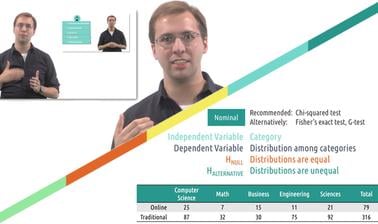MOOC List is learner-supported. When you buy through links on our site, we may earn an affiliate commission.

MOOC List is learner-supported. When you buy through links on our site, we may earn an affiliate commission.
In this final course in the professional certificate, you’ll complete your understanding of the design life cycle, and learn about the modern relevance of human-computer interaction.
You’ll begin by learning about evaluation. This is the critical final step of the design life cycle, where we put our prototypes in front of real users (or strong approximations thereof) to get feedback on their quality. You’ll learn about three methods for evaluation: first, qualitative evaluation lets you get direct feedback on the strengths and weaknesses of your interface from real users. Second, quantitative evaluation lets you make strong claims about the effectiveness of your interface or the validity of your theories of interaction. Third, heuristic evaluation lets you inject evaluation much more completely into the design process, persistently putting yourself into the mindset of a user to investigate an interface.
Then, you’ll learn how human-computer interaction relates to a modern trend in software development, Agile design. HCI and Agile development have a deep symbiosis in the way they each value rapid feedback. Moreover, modern technologies have allowed high-fidelity prototypes to be developed with the relative ease of low-fidelity prototypes in the past, allowing even better feedback and evaluation to come in throughout the design process.
After wrapping up your understanding of the design life cycle and its iterative nature, you’ll turn your attention to a deeper dive into the modern state of human-computer interaction. You’ll have the chance to explore cutting-edge research in HCI, from technologies like extended reality to domains like cybersecurity to ideas like gesture-based interaction. HCI is a dynamic and evolving field, and any education it would not be complete without a chance to look at what’s happening today.
Finally, you’ll conclude by looking at how far you’ve come and what you could do next. From other MOOCs to graduate degrees in the field, there are enormous possibilities for further studies in HCI.
By the end of this course, you’ll have an understanding of the importance of evaluation in the design life cycle, as well as an understanding of where HCI sits in modern development and research.
This course is part of the Human-Computer Interaction Professional Certificate.
What you'll learn
- Methods for qualitative evaluation, including think-aloud studies and post-hoc interviews.
- Methods for empirical evaluation, including hypothesis testing and experimental design.
- Methods for heuristic evaluation, such as cognitive walkthroughs and task analysis.
- The symbiosis between HCI and Agile development cycles.
- The current state of HCI technologies such as extended reality, mobile devices, and robotics.
- The current state of HCI in domains like education, healthcare, and cybersecurity.
- The significant sub-schools of HCI such as social computing, computer-supported collaborative work, and information visualization.
- What you can expect to do next in HCI.
MOOC List is learner-supported. When you buy through links on our site, we may earn an affiliate commission.
MOOC List is learner-supported. When you buy through links on our site, we may earn an affiliate commission.
